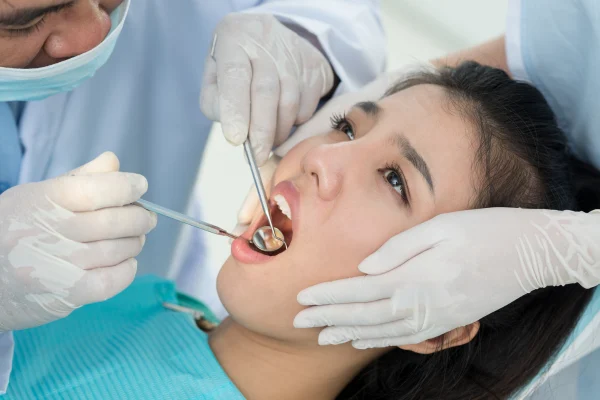What is Root Canal Treatment?
Root canal treatment is a dental procedure used to remove infected or damaged pulp from the inside of a tooth. The procedure eliminates infection, relieves pain, and protects the tooth from further damage.
How does Root Canal Treatment work?
The dentist begins by numbing the area and isolating the tooth. A small opening is made to access the pulp chamber, and the infected tissue is carefully removed. The canals are cleaned, disinfected, and sealed with a filling material to prevent reinfection.
What are the benefits of Root Canal Treatment?
- Relieves severe pain and sensitivity.
- Saves the natural tooth from extraction.
- Prevents the spread of infection to other teeth or tissues.
- Restores normal chewing and biting function.
- Maintains your natural smile and oral aesthetics.
Who is Root Canal Treatment for?
Root canal treatment is suitable for individuals experiencing:
- Persistent tooth pain or sensitivity to hot and cold.
- Swelling or tenderness around the affected tooth.
- Discoloration of the tooth caused by internal damage.
- Deep decay or infection reaching the pulp.
What are the different types of Root Canal Treatments?
- Single-Visit Root Canal: Completed in one session for straightforward cases.
- Multi-Visit Root Canal: Spread over multiple appointments for complex cases.
- Retreatment: Performed on a previously treated tooth if reinfection occurs.
What is the process of Root Canal Treatment?
- Consultation and diagnostic imaging (e.g., X-rays) to evaluate the tooth.
- Numbing of the affected area for a pain-free experience.
- Removal of infected or damaged pulp tissue.
- Cleaning and sealing of the root canals.
- Placement of a filling or crown to restore the tooth’s function.
How long does the procedure take?
A single root canal session typically lasts 60 to 90 minutes. Multi-visit treatments may require 2-3 appointments, depending on the complexity.
Is Root Canal Treatment painful?
Modern techniques and local anesthesia ensure that the procedure is virtually pain-free. Any discomfort during recovery can be managed with prescribed pain relievers.
What is the aftercare process?
To ensure proper healing and long-term success:
- Avoid chewing hard foods on the treated tooth until a crown is placed.
- Maintain good oral hygiene with brushing and flossing.
- Attend follow-up visits to monitor the treated tooth’s condition.
What results can I expect?
Root canal treatment provides immediate pain relief and preserves the natural tooth. With a crown or restoration, the tooth will look and function like a healthy, natural tooth.
How many sessions are required?
Most root canals are completed in 1-2 sessions. More complex cases may require additional visits.
How much does Root Canal Treatment cost?
The cost of root canal treatment in Dubai ranges from AED 1,200 to AED 2,500, depending on the tooth type and complexity of the case. Contact us for a personalized quote.
Are there any package deals or discounts?
Yes, we offer flexible payment plans and discounts for multiple treatments. Contact us to learn more about our current offers.
What technology is used for Root Canal Treatment?
Legacy Dental utilizes advanced tools such as digital imaging, rotary instruments, and apex locators to ensure precise and efficient root canal treatment.
Are there any side effects?
Patients may experience mild tenderness or swelling after the procedure, which usually subsides within a few days. Proper aftercare minimizes the risk of complications.
How do I prepare for the procedure?
- Inform the dentist about any medical conditions or medications.
- Avoid eating right before the appointment if sedation is used.
- Discuss any concerns or questions with your dentist.
What is the success rate of Root Canal Treatment?
Root canal treatments have a high success rate, often exceeding 95%, when performed by skilled professionals and followed by proper aftercare.
Does getting Root Canal Treatment require follow-up visits?
Yes, follow-up visits may be needed to place a permanent crown or monitor the healing process. Regular dental check-ups are also recommended to maintain oral health.



























